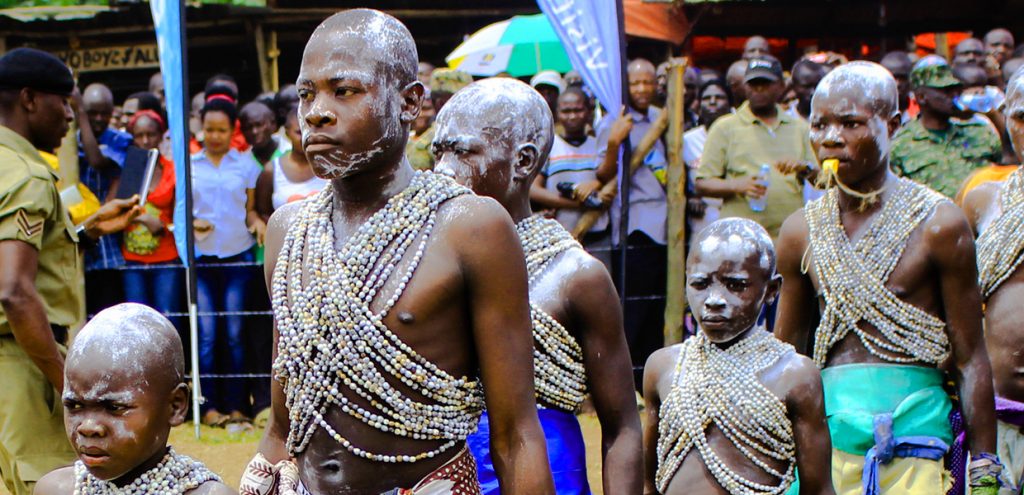The Bagisu people or Bamasaba inhabit the western and southern halves of Mount Elgon. On the west, the mountain spreads like the fingers of a hand with steep and narrow valleys between them. On the south, the land is broken and consists of a jumble of hills jammed against a high escarpment like a crumpled tablecloth. The escarpment fades gradually to a plain leading away to the northeast, inhabited by the Iteso tribe.

The Bagisu speak a dialect of the Lumasaba language called Lugisu, which is fully understandable by other dialects, and is also understood by the Bukusu. The Bagisu or Bamsaba undergo a circumcision ritual called the Imbalu. The ritual is held every two years during the month of August.
Origin of Bagisu (Bamasaba) People
The Bagisu have no tradition of an early migration from any where. They assert that their ancestors were called ‘Mundu’ and ‘Sera’, whom tradition says came out of a hole in Mountain Masaba (Elgon). Their early life seems to have been anti-social, almost based on the principle ‘survival of the fittest’. Very little is so far known about their history but they are known to be related to a sub-group of the Luhya of Kenya known as the Bukusu.
The Bagisu are believed to have separated from the Bukusu sometime in the 19th century. The tradition claiming that they have always lived where they are throughout history is not fashionable. The earliest immigrants into Bugisu area are believed to have moved to Mount Elgon area during the 16th century from the eastern plains.
Their earliest home is said to have been in the ‘Uasin Gishu’ plateau of Kenya. They seem to have been an end product of the mixing of peoples of different origins and cultures, but since their language is Bantu; their predecessors should have been Bantu speakers as well.
Along the Ugandan side of Mount Elgon, around Sipi Falls and Mbale town you can meet the proud Bagisu people. Oral legends has it that the one the Bagisu can trace their origin to is ‘Masaba’ who is believed to have come forth from a cave on Mount Elgon. Masaba means mountain in Lugisu, that’s why such a story is told among the Bagisu that Masaba would be found high in the upper slopes of Mount Elgon where he gathers with lesser deities and where stones can be found arranged in form of tables and chairs.
In Bagisu society there is no central rule, each one of the clans has a non-hereditary chief that is appointed by a council of elders. The real control was in the hands of the traditional religious leaders, also referred to as sorcerers and witches. It was held as an iron grip on society, traditions, beliefs and one of them is the ‘Imbalu Circumcision’ when the boys became men in the tribe and take on all privileges and responsibilities of a male in that tribe, including marriage.
Traditional Imbalu Circumcision Ceremony
The Imbalu circumcision rituals are one of those societal norms passed down from the days of old to present. Oral legends tells us that the first ‘Mugisu’ man that was circumcised had a reputation of a womanizer, seducing women in his village and beyond, including many who were married. He was brought before the elders who decreed that he should be castrated as a punishment and a deterrent to other men.
Something did not work out as decreed, he was only circumcised and after he recovered he continued his ways of old seducing even more women, it was said by some of them that he had become an even better lover. Other men not wanting to be left out on such pleasures had themselves circumcised in order become like the first Mugisu who was circumcised.
Public Imbalu circumcision ceremonies are held during even numbered years, between the months of August and December. It is a pivotal occasion in Bagisu society, where male individuals undergo the ritual of passage to manhood. This involves the whole local community with even visitors allowed from far and wide.
Boys and young men between 16 – 25 years, sometimes even younger or much older, are considered the acceptable age for the Imbalu. Those that decide to be circumcised announce their intention in June or May and spend the following few months preparing for the Imbalu Ceremony.
The circumcision ceremony is done early in the morning before 10:00am, and involves all the initiates from a given clan, a number of young men encouraged by a whistling and cheering crowd making their way to the circumcision ground carrying the initiates on their shoulders. The initiates have their faces plastered in ash and they are stripped half naked below the waist on their way to the circumcision ground. They usually line up in front of the crowd of family and friends, both male and female since the ritual is done in public.
Imbalu circumcision rituals are the basis for male Bagisu identity by making them stand out as a race of ‘men’ (basani) as opposed to other non-circumcising tribes whom the Bagisu people consider as boys (basinde). One graduates into a ‘man’ and is considered responsible and indeed a real Mugisu through circumcision. The women’s ‘true’ identity is also defined by marrying a real man, one who is circumcised.
Those who fear the circumcision try to avoid it, but after becoming men they may have to endure a rough forced circumcision. Such stories even make it to the headlines of local newspapers where a Mugisu returning from abroad had to prove that he was indeed a man.
The public Imbalu circumcision ceremonies are an insight into the culture and traditions of the Bagisu and should your safari be during a time when the ceremonies take place, we will make sure you are aware of it.
Besides Bamasaba, Uganda is a rich multi-cultural country, so don’t miss out on experiences with the nearby Sebei people, Iteso People and further northeast, the famous Karamojong group or Ike community. Get mesmerized by the Batwa trail in both Bwindi Impenetrable National Park and Mgahinga Gorilla National Park. While in Bwindi, you can also also opt for the breathtaking gorilla trekking experience.
